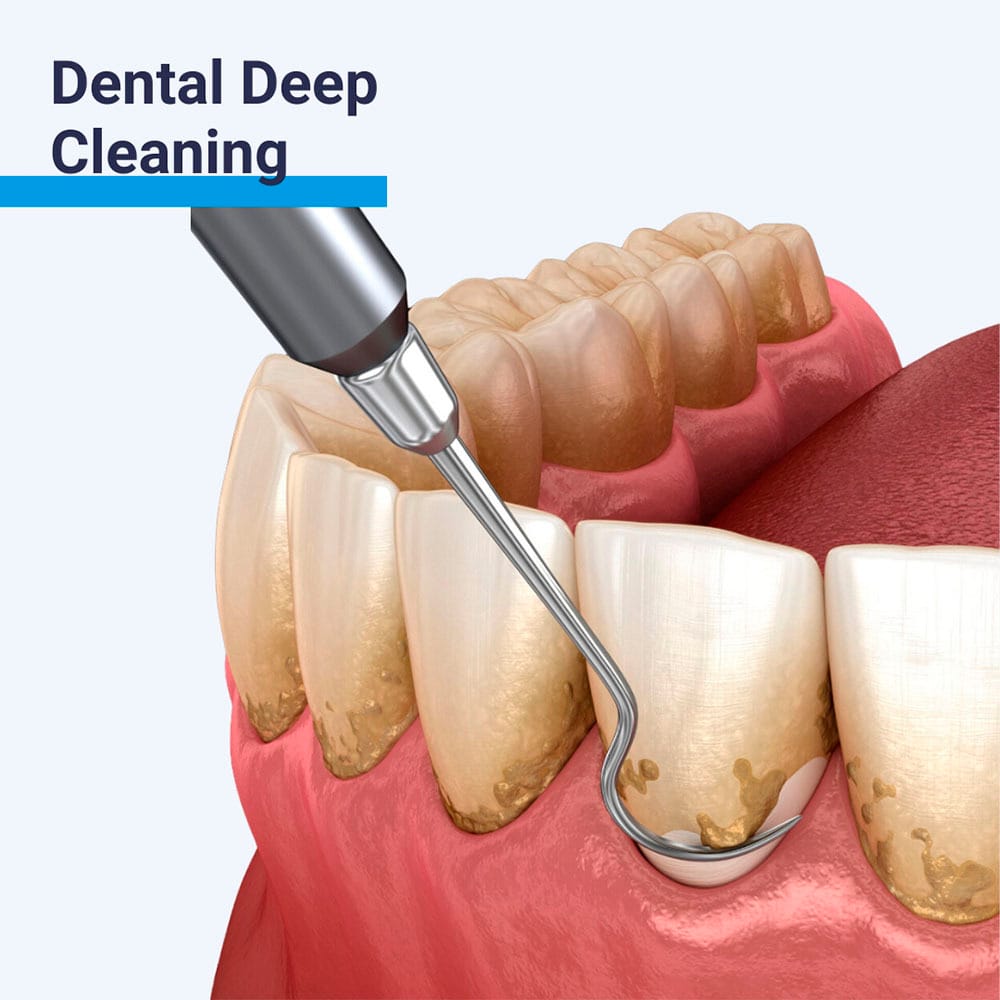What Is a Dental Deep Cleaning?
 Treatment is also called scaling and root planing. It is similar to an ordinary hygiene appointment but cleans deeper beneath your gums.
Treatment is also called scaling and root planing. It is similar to an ordinary hygiene appointment but cleans deeper beneath your gums.
Teeth scaling removes plaque and tartar from above and below your gum line. Root planing is a procedure to smooth roughened tooth roots. Creating a smooth surface aids healing and recovery afterward.
Teeth scaling and root planing can eliminate harmful bacteria found in plaque and tartar. After treatment, your gums will heal and fight infection more easily. They should also begin to fit more snugly around your teeth.
When Is a Deep Dental Cleaning Necessary?
We will recommend this procedure after identifying signs of periodontitis or gum disease. Symptoms can include:
- Frequent gum bleeding while brushing or flossing or at other times.
- Receding gums, where pockets have formed in between your gums and teeth.
- Persistent bad breath.
- Exposed tooth roots.
What to Expect During Treatment
Initially, you will need a full gum evaluation with our dentist or our periodontist, Dr. Richard Nejat, at Clock Tower Dental.
The procedure for scaling and root planing is very straightforward, and the steps are outlined below.
- Before we begin, we can provide a local anesthetic to numb your gums to ensure you feel entirely comfortable during this treatment.
- All plaque and tartar are removed or scaled away from your teeth, both above and below your gums. The tartar is loosened using ultrasonic tools. Special hand tools allow us to remove it thoroughly.
- Exposed tooth roots are planed or smoothed. This makes it easier for your gums to reattach around your teeth and harder for new plaque to build up.
- If your gum infection is more severe, we may place topical antibiotics around your tooth roots or prescribe a course of oral antibiotics.
Recovery after Treatment
Your recovery after this procedure should be quick and uneventful. Some people feel perfectly okay to return to everyday activities on the same day.
This treatment is less invasive compared with other gum disease procedures. There is no need for incisions or stitches; you can eat whatever you wish afterward.
We will give you full instructions on caring for your mouth after a deep dental cleaning and are always here to answer any questions.
How Long Will Treatment Take?
Treatment can take anywhere between one and two hours to complete. We may wish to clean your entire mouth during a single visit.
Alternatively, we might suggest cleaning one section of your mouth during one appointment. You would need a second appointment to clean the other part of your mouth. We might suggest this if the infection is more severe and to ensure you feel more comfortable during treatment.
How Frequently Should I Have Scaling and Root Planing?
You may only need one treatment to help restore good gum health. However, if you have more severe periodontitis, we may suggest you follow a treatment plan for deep cleaning teeth more frequently.
Severe periodontitis can be chronic, and regular dental deep cleanings can help control it more successfully.
After scaling and root planing, following a good oral care routine at home is important to maintain healthy teeth and gums.
What Are the Benefits of a Dental Deep Cleaning?
Benefits of this treatment can include:
- Improving overall gum health by removing harmful bacteria.
- Protecting overall health as these bacteria can travel through bleeding gums, affecting other parts of your body.
- Preventing further gum recession.
- Preventing tooth loss.
- Reducing your risk for advanced periodontitis.
Are There Any Risks of a Dental Deep Cleaning?
It’s rare to have any complications after this treatment. Dental deep cleaning is a standard treatment for mild or moderate gum disease and is generally very successful. Possible complications could include:
- Tooth sensitivity, but this should be temporary.
- Tenderness as your gums could be sore for a few days afterward. Any discomfort should be manageable with over-the-counter painkillers.
- Infection, but we can prescribe antibiotics if we feel this is a risk.
- Receding gums, as your gums will shrink back once the infection is reduced or eliminated, which could expose more of your tooth roots.
- Loose teeth immediately after deep dental cleaning should begin stabilizing once your gums shrink and tighten around your teeth.
How Much Will Deep Cleaning Teeth Cost?
The cost will depend on the time required to clean your teeth. We can give you a complete estimate when you visit our dental office. If you have dental insurance, it will likely cover the cost of this procedure, which is important for gum health.
If we recommend a deep dental cleaning, it’s because we want to improve your oral health. It is the only way to remove plaque and bacteria that have penetrated deep within your gums and can help save and protect your teeth.

